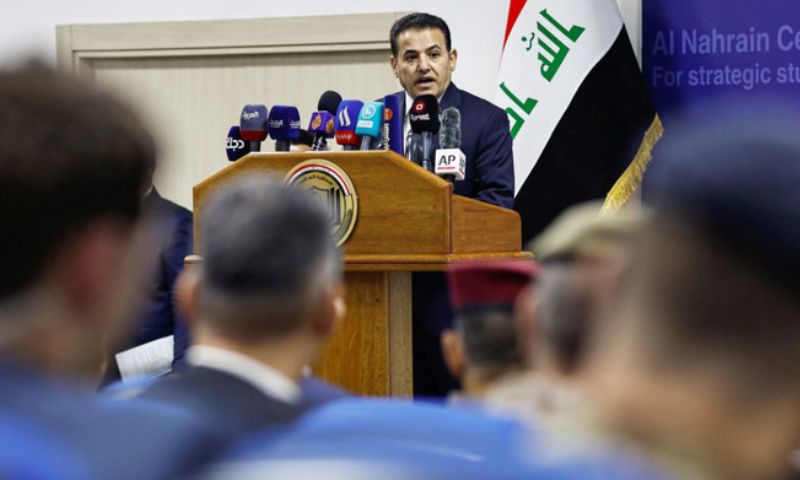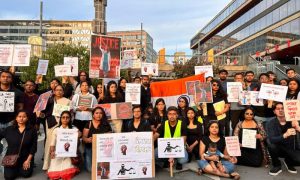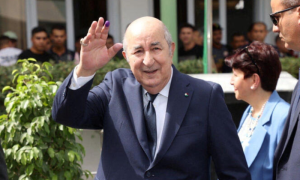BAGHDAD: Iraq is taking significant steps to repatriate its citizens from the Al-Hol camp in northeastern Syria, a facility primarily housing the families of former Daesh fighters and their supporters.
The move is driven by Iraq’s determination to mitigate cross-border security threats and eventually close down the camp.
Since the defeat of Daesh in Syria in March 2019, a considerable number of Iraqi nationals, including women and children, have been residing in Al-Hol.
Iraqi authorities now view Al-Hol as a major security risk, a breeding ground for radical ideologies, and a place where children are at risk of becoming future militants.
Ali Jahangir, a spokesperson for Iraq’s Ministry of Migration and Displaced, has described it as a “time bomb” that could erupt at any moment. To address this, Iraq has intensified its efforts to repatriate its citizens from the camp. Since January, more than 5,000 Iraqis have been repatriated, with more expected to follow in the coming weeks.
Most of those repatriated are women and children, as male Iraqis who were involved in criminal activities as Daesh members are often reluctant to return due to the fear of prosecution. Iraqi authorities conduct thorough security checks before granting final approval for repatriation.
Once back in Iraq, detainees are typically sent to the Jadaa camp near Mosul, where they undergo rehabilitation programs with the support of UN agencies. These programs include therapy sessions with psychologists and educational classes aimed at helping individuals abandon their extremist mindset.
Iraq urges other countries to repatriate their citizens from Al-Hol
Iraq has also been calling on other countries to repatriate their citizens from Al-Hol, emphasizing the camp’s role as a potential source of terrorism. At a conference in June, Iraq’s Foreign Ministry spokesperson, Ahmad Sahhaf, stressed the importance of repatriation to ultimately close the camp and avoid a resurgence of Daesh.
The Al-Hol camp, heavily guarded by Syrian Kurdish-led forces allied with the United States, was once home to 73,000 people, predominantly Syrians and Iraqis. Over the years, the population has decreased to just over 48,000, with about 3,000 released since May.
The remaining detainees come from approximately 60 other countries, complicating efforts to close the camp as it requires cooperation beyond Iraq and Syria.
Currently, Al-Hol houses 23,353 Iraqis, 17,456 Syrians, and 7,438 individuals from various other nationalities. The foreign detainees, though a minority, are considered the most challenging due to their steadfast allegiance to the core Daesh ideology.
This year, two groups of Syrians have been able to return to their hometowns in Syria, and 92 families recently returned to Raqqa, while 219 people returned to Manbij in May.
For Syrian nationals, release is determined by Kurdish authorities when they are deemed no longer a threat. However, the release of detainees from other countries is more complex, as their home countries must agree to accept them back.
Non-Syrian and non-Iraqi nationals reside in a section of the camp known as the Annex, where the most ardent Daesh supporters are housed. Many of these individuals travelled great distances to join the extremist group when it gained prominence in 2014.
In late August, Kyrgyzstan repatriated 31 women and 64 children from the camp, with the assistance of the U.S. government. However, many Western countries have been hesitant to take back their nationals who were associated with Daesh.
Despite Daesh’s defeat in Iraq in 2017 and Syria in 2019, the group’s sleeper cells continue to carry out deadly attacks. Reports of horrific conditions and human rights abuses within Al-Hol have raised concerns among advocacy groups, who have called for humanitarian assistance to improve the camp’s living conditions, especially for children.
The U.S. military recognizes the reduction of Al-Hol’s population as a necessary step in the ongoing fight against Daesh. Reducing the camp’s population contributes to regional safety, security, and stability, according to U.S. Major General Matthew McFarlane, the commanding general of the anti-Daesh coalition.
The United States, in collaboration with other foreign affairs ministries, is actively working to decrease the number of detainees in Al-Hol to improve the camp’s conditions and enhance security in the region.






















